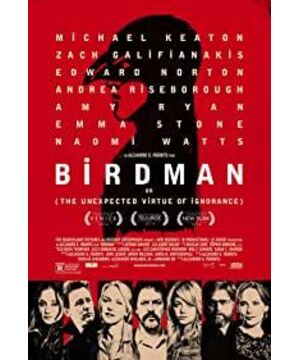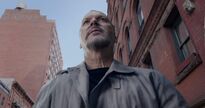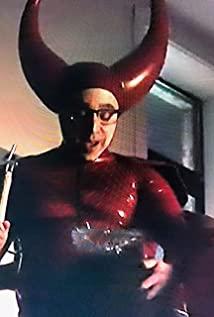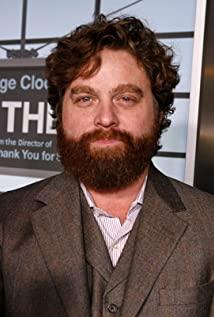——Act 4, Scene 4 of "Macbeth"
If you look at it from the perspective of "inheritance and transformation", the "turn" of "Birdman" begins with the tearing of the face of the protagonist and the critics. Earlier, the audience had learned how important "face", or more politely, "image", was to this outdated actor. In fact, like all "internal dramas" with sufficient depth, "Birdman" inevitably touches on a series of important issues related to the drama itself, so as to clearly distinguish itself from the kind of spicy but shallow satire . The fact is that the film may have revealed to us the most fundamental survival dilemma of the actor--it is "fundamental" because this dilemma is rooted in the identity of the "actor" itself-"actor" can only be seen in the eyes of the audience. Only then can he see his own existence; but what he sees is not so much himself, but rather his own "image" - a mask, funny or sad. It is this that is the source of all the anxiety of Michael Keaton's protagonist: he does not feel the weight of his existence outside of people's field of vision - the future is clear, and if he does not struggle to resist, he will be reduced to " Birdman” is the ghost behind the mask, and along with it, becomes “lighter than a feather” (in this film, floating in the air, whether it means the freedom of the mind or the “unbearable lightness of life” is always ambiguous Unknown); however, it is also this point that determines that his struggle is doomed to a disastrous end. Because, as long as you still call yourself an "actor", the only way to continue to exist in the eyes of the audience is to cover the old mask with a new mask; there is no other way. Then, when the protagonist tries to be noticed by the public as a "player", a puzzling problem is also highlighted. That is, even if he really succeeds in the end, is the "actor" in the eyes of the audience really him—actor himself, or just another mask named "actor", just like the "actor" at the beginning. "Birdman" one?
In fact, the above problems have already emerged when the protagonist first revealed his "true appearance": at that time, what the audience actually saw was the protagonist's mirror image and the "bird-man" hanging on the wall - in my opinion, rather than This scene is understood as "the person" and his split personality, it is better to regard it as two masks juxtaposed in front of him. You know, taking a self-portrait in the mirror is always just a false self-identification. At this point, Edward Norton's "Broadway" is not spared because he always chooses "Truth"; on the contrary, looking at his narcissistic eyes in front of the naked mirror is enough to understand his love for The deep indulgence of this "phantom". As for the fanatical obsession with "real experience", it only responds to the famous saying "when the fake is real, it is also fake" - the more "omnipotent" in the play, the more "powerless" outside the play; The more realistic and full the image, the more shriveled and withered (Literally, you know) real life. Just like Edgar Allan Poe's novel called "The Oval Portrait": the portrait steals the life of the model little by little, and the "photograph" finally deprives the "authentic" of the "true" qualification. Of course, if there's anything to be thankful for, it's that for an actor, this sort of absurd "fairness" means success in the usual sense - after all, Norton has always been a critic's Beloved; and Keaton doesn't even qualify. For the latter, the "successful actor" is his mirror image, his ideal self, and his whole endeavor is to see it in the eyes of the audience (and not only in his own eyes)! Perhaps this is why he chose the theater: not only because of the traditional concept, the difference between "drama/literature" and "movie/comic" makes the former seem more "immortal"; it is also because there, you can Seeing for the first time that you are being "seen" - that's what the word "Theatre" originally meant.
However, it was in the so-called "turn" part above that this pretentious performance in front of the mirror was forced to end - the arrogant drama critic announced that no matter how much effort was paid, no matter how good the work was, no matter what way To please and please, the protagonist cannot be "seen" as he aspires to be! ——Compared with the previous defeats, this was undoubtedly the most fatal blow. Therefore, we heard the lines at the beginning of this article; and, even in a film such as "Birdman", where "intertext" and "puns" are intertwined, it is difficult to find any sentence that can compare to "Birdman". These few sentences more intuitively reflect the soul of the film - "Life is but a walking shadow, a clumsy actor who points and gestures on the stage. It's a story told by a fool, full of noise and commotion, but can't find any meaning!" - If this still does not illuminate the protagonist's situation, then when the "madman" who shouted these words turned around suddenly, it was as if Another crappy actor at the beginning of the movie (a botched actor!), and it's only when Keaton suddenly realizes that he's in the so-called "madman guiding the blind" situation in "King Lear". The terrified look on his face was enough to prove that what he saw was not someone else, but himself—who? A "fool" who thinks he is a "player"! ... At this moment, the delusion of the mirror image is completely seen through; so it is not surprising that the protagonist, for the first time, never looked into the vanity mirror once during the interval between the premieres. By contrast, it doesn't really matter what comes next (Carver's novel doesn't matter here), only the lines of the play require you to listen carefully - "I don't exist!" - which is why the protagonist is Nick for one moment, and Nick for the next. It's Eddie again: Because he's nothing, he's everything! Only at this time, only when the "self" admits its "non-existence", will the "bird-man" take advantage of the "empty" to enter, occupying the empty personality of the subject like a ghost, and begin to joke and mock, To play an actor's tragedy, a fool's comedy!
Now, it's time to talk about that breathtaking (pseudo) long shot. Attentive audiences will find that, strictly speaking, the film does not really create the visual effect of "one shot to the end" (obviously, this is by no means the director and the photographer's poor skills, but it is a deliberate act of "if you can't do it, don't do it". ): for most of the film, the camera moves uninterruptedly in an "incredible" way that leaves the viewer in a cage-like labyrinth: the longer you spend in this claustrophobic space , the more subconsciously you want to find an exit. At one time, we thought that this "labyrinth" was a theater - it's no wonder that the use of long lenses gives space a certain sense of continuity and stability that cannot be broken, but makes time compressed and distorted in space, even evacuated. How similar is it to sitting in front of a framed stage and enjoying a play that spans several years but is less than two hours long! - but it's far from the truth: look, when the protagonist is accidentally locked out of the backstage and has to cross the entire street to get back to the theater from the main entrance, he doesn't escape the "cage" for a moment : As soon as he took to the street, this poor man with no clothes was caught by the eyes of the crowd, and he was immediately "captured" in the most embarrassing way - first on the "retina", and then connected by various photography and camera tools. "the Internet". What can really be called an "exit" can only be a montage as opposed to a long shot; the latter only appears twice in the film - once at the beginning of the whole film: a "falling star" falls from the sky , echoing the saying behind "Birdman is like Icarus", he entered the "cage" in the blink of an eye (no wonder we heard the complaint of "Birdman" at the beginning); the other time was the protagonist on the stage Self-Determination by Shooting - The Gun's Going! The huge maze was cracked! Clip! Export! You, the kind, recite in your heart: If you can't win in people's eyes, then hopefully, he can escape from it.
Absurdly and cruelly, the protagonist failed to "escape"; on the contrary, he seemed to have won "victory"! All the things he longed for in the past are now pouring in: the critics are full of praise, the media is flocking, and even his daughter has bought the flowers he wants (but he can no longer smell the flowers, which is a metaphor). But, is it really him who wins? - Come to think of it, with the sound of a gunshot on stage, who among us really saw "him" again? ——What we see is not just a still photo in the newspaper, a weird "mask" made of gauze (like the one on the poster of the musical "The Phantom of the Opera" that appears countless times in the film) , and the unfamiliar face in the mirror that he didn't even recognize himself? ——Therefore, the ending of the film brings us back to the question at the beginning of this article-when an actor finally gets attention as a "actor", the "actor" here is far from himself! ——His "success" is "his" failure. If there's anything more frustrating than that, it's that even the chattering "Birdman" is silent at the moment: does that mean inner peace? Or is it in response to the deafening sentence - the "sound and fury" has ceased, is this really "heard no more", really "nothing"? ... If you are inclined towards the latter, then you may agree with me on the following point of view: in a sense, whether the protagonist "survive or perish" after jumping from the window has been an "inappropriate" question from the very beginning. As early as the moment an artist with blood on the stage was born in the eyes of the audience, he no longer "exists". Or to be more precise, there is no existence, and there is no escape. This is the biggest paradox about the protagonist. So I'm not without a stubborn belief that the film's final scene is far less optimistic than it seems. Because for us, whether falling or flying, it only exists in a pair of eyes-maybe in this world, only there is his destination.
View more about Birdman or (The Unexpected Virtue of Ignorance) reviews











